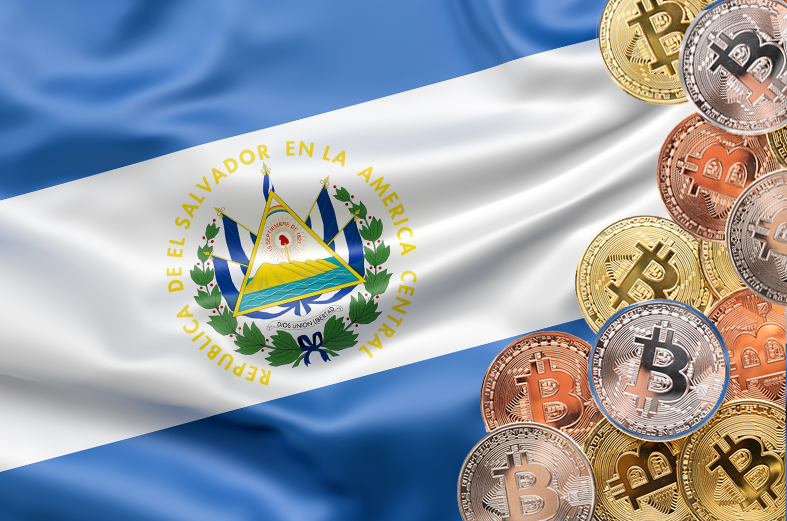On 7 September, the Bitcoin Law came into force in El Salvador, establishing the famous bitcoin cryptocurrency as legal tender alongside the dollar.
It is a historic and pioneering measure that places the Central American country in the international spotlight, as it has committed to bitcoin as a mechanism to promote the development of the Salvadoran economy.
New regulation: Bitcoin law
In June 2021 the Legislative Assembly approved the regularisation of the use of the currency, with the first draft of the legislation coming into force at the end of August.
With the adoption of Bitcoin as national legal tender, a wealth of possibilities and opportunities opens up for the country, but at the same time there will be a wide range of challenges to be faced by companies and financial institutions.
However, there is growing scepticism in El Salvador regarding the adoption of the cryptocurrency as legal tender. In fact, it has been criticised by various groups of economists, concerned mainly about the instability of the currency and its criminal use.
Thus, a financial structure based on criptocurrencies has created uncertainty and a convulsive environment in terms of international investments. For this reason, the regulations created by the government of the charismatic president Nayib Bukele aim to offer transparency and security to attract foreign investment
![]() The government has created a platform called Chivo, a state digital wallet that can be downloaded by the entire population on their mobile devices. In addition, 200 Chivo ATMs have been installed throughout the country.
The government has created a platform called Chivo, a state digital wallet that can be downloaded by the entire population on their mobile devices. In addition, 200 Chivo ATMs have been installed throughout the country.
As a measure to encourage the use of the crypto asset and this platform within society, the Salvadoran government is granting 30 dollars in bitcoin to all new users.
![]() The government has created a platform called Chivo, a state digital wallet that can be downloaded by the entire population on their mobile devices. In addition, 200 Chivo ATMs have been installed throughout the country.
The government has created a platform called Chivo, a state digital wallet that can be downloaded by the entire population on their mobile devices. In addition, 200 Chivo ATMs have been installed throughout the country.
As a measure to encourage the use of the crypto asset and this platform among society, the Salvadoran government is granting 30 dollars in bitcoin to all new users.
New challenges to overcome after bitcoin adoption
Due to the anonymous nature of the currency, the guidelines given by the government for the management and organisation of companies in this new framework are aimed at avoiding money laundering and terrorist financing due to the possible malicious use of bitcoin.
Obliged entities must have a protocol in place to control information about their customers in order to assess, identify and verify their identity when confirming a transaction, and must have systems in place to prevent, detect and disclose the risks of financial crimes, such as money laundering and terrorist financing.
To this end, the central bank will force companies that want to offer bitcoin products/services to comply with a series of requirements, including the need to meet procedures to identify customers.
![]() Article 2 of the new bitcoin law considers Banks, Cooperative Banks and Savings and Credit Societies that are interested in providing the service of convertibility of dollars and bitcoin and vice versa, through providers of:
Article 2 of the new bitcoin law considers Banks, Cooperative Banks and Savings and Credit Societies that are interested in providing the service of convertibility of dollars and bitcoin and vice versa, through providers of:
- Digital bitcoin and dollar wallets;
- Digital exchanges or exchanges for bitcoin and dollars;
- Payment service providers for bitcoin and dollars; and
- Any other entities in the value chain of the product or service related to this Rule, such as: custodians and bitcoin-related technology providers.
The products and services referred to in these Rules shall only consider currencies that are legal tender in Salvadoran territory.
![]() Article 2 of the new bitcoin law considers Banks, Cooperative Banks and Savings and Credit Societies that are interested in providing the service of convertibility of dollars and bitcoin and vice versa, through providers of:
Article 2 of the new bitcoin law considers Banks, Cooperative Banks and Savings and Credit Societies that are interested in providing the service of convertibility of dollars and bitcoin and vice versa, through providers of:
- Digital bitcoin and dollar wallets;
- Digital exchanges or exchanges for bitcoin and dollars;
- Payment service providers for bitcoin and dollars; and
- Any other actors in the value chain of the product or service related to this Rule, such as: custodians and bitcoin-related technology providers.
The products and services referred to in these Rules shall only consider currencies that are legal tender in Salvadoran territory.
Digital identification under bitcoin law
Digital identification will be carried out by electronic means that substitute physical presence through digital identity verification processes and technologies such as biometric records, DUI (unique identity document) scanning, geolocation and IP recognition among other rigorous techniques, or alternative technological methods with the same storable and non-manipulable security, according to the following specifications::
- Identify the customer reliably by means of their identity documents and other basic information requested by the institutions while ensuring that the document is an original.
- In the case of legal persons, in addition to identifying them, they will also have to know and document their legal nature, company name, economic activity as well as accreditation and identification of the legal representative, shareholders and partners with more than 10% of participation in the board of directors.
- Any procedure that includes the presentation of the original customer identification document may be used.
- The electronic due diligence process should be time and date stamped and retained in their computer systems.
- Verify lists of natural or legal persons involved in money laundering, financing of terrorism or proliferation of weapons of mass destruction from local and international bodies. Likewise, lists relating to countries considered to be jurisdictions with no or low taxation, natural or legal persons linked to criminal acts, including terrorism, and those who perform or have performed prominent public functions in the country or country of origin (PEPs), should be verified prior to establishing or initiating any financial business with potential customers.
- Request documentation in accordance with the level of risk under the AML.
- Establish transactional profiles of customers relating to transactions and services they conduct with the institution, according to their economic activity.
- Entities should identify beneficial owners in all transactions or operations carried out with them.
- Creation of a register of customers of the institution who have reported suspicious transactions.
- Monitoring of transactions in order to ensure that operations are consistent with their transactional profile.
- Monitor customers located in high-risk countries.
In addition, all obliged entities must maintain the record keeping requirements for the duration of the business relationship with the customer and for a period of 15 years from the end of that relationship.
Don’t worry, our technology can help you
We know that all these measures can be overwhelming for companies that do not have KYC (Know Your Customer) and due diligence processes in place.
Don’t worry, with MobbScan, our digital onboarding solution, you can verify the identity of a new user through their DUI (unique identity document) by extracting all the information from it and verifying that it is an original document issued by The Salvadoran State.
But our solution does not stop there. It allows you to check that the users carrying out the process are who they say they are by comparing a selfie with the one that appears on their DUI, making the process very robust.
In addition, MobbScan allows you to record the entire onboarding process in a video, as a support in an unattended process for later review and storage.
We perform hundreds of daily verifications in El Salvador, with different companies in the financial sector that already rely on our technology, such as Banco Promérica, which uses Mobbeel technology to verify the identity of its customers when opening a bank account.
Don’t get left behind… and talk to us without any commitment.
If you want to know more about MobbScan, our KYC solution, do not hesitate to contact us, and if you liked the article, share it and add value to your followers!

I’m a Software Engineer with a passion for Marketing, Communication, and helping companies expand internationally—areas I’m currently focused on as CMO at Mobbeel. I’m a mix of many things, some good, some not so much… perfectly imperfect.

INDUSTRY PAGE
Discover everything we can do for the financial sector
Identity verification is key for modernising banking processes, adhering to current regulations, and meeting the needs of digital customers and new generations.




